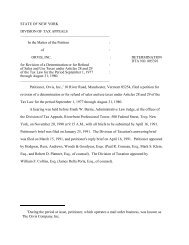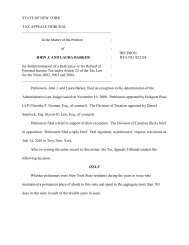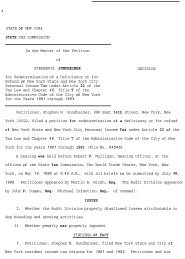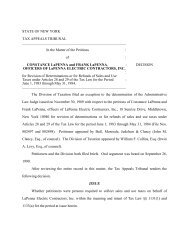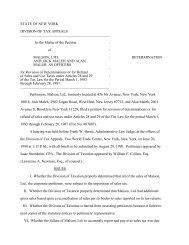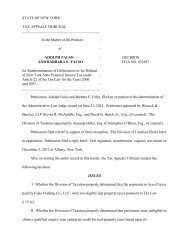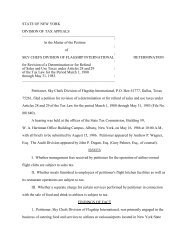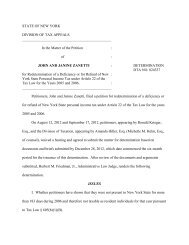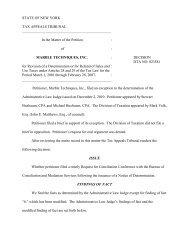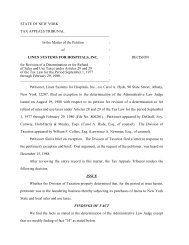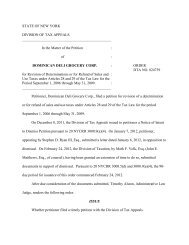state of new york tax appeals - Tax Appeals Tribunal
state of new york tax appeals - Tax Appeals Tribunal
state of new york tax appeals - Tax Appeals Tribunal
Create successful ePaper yourself
Turn your PDF publications into a flip-book with our unique Google optimized e-Paper software.
-8<br />
To arbitrarily assume the missing work orders to be totally <strong>tax</strong>able would be<br />
highly unjust. Since the corporation [sic] contracts are fairly consistent from year<br />
to year, the total <strong>tax</strong>able to non-<strong>tax</strong>able ratio would remain the same. At best, the<br />
<strong>tax</strong>able portion <strong>of</strong> the missing work orders would be approximately the same ratio<br />
as the work orders you examined.<br />
The purpose <strong>of</strong> an audit is to arrive at a fair and just <strong>tax</strong> which we are will [sic] to<br />
pay. To call the missing work orders totally <strong>tax</strong>able would be unfair and unjust.<br />
The search for the missing work orders has been exhausted and no additional<br />
orders have been located.<br />
On or about November 12, 2003, Mr. Glamcevski faxed to the Division a copy <strong>of</strong> an<br />
exempt organization certificate for the Liverpool Fire Department, Inc., as well as information<br />
pertaining to the amounts paid by the Liverpool Fire Department to the corporation for cleaning<br />
services rendered from May 2000 through November 5, 2003. Notations in the audit log indicate<br />
that the auditor removed sales to this customer from work papers detailing <strong>tax</strong>able sales because<br />
the sales were to a <strong>tax</strong> exempt organization. Subsequently, on or about January 12, 2004, the<br />
auditor mailed to Mr. Glamcevski work papers detailing her audit findings <strong>of</strong> <strong>tax</strong>able sales<br />
transactions, <strong>tax</strong>able expense purchases and <strong>tax</strong>able purchases <strong>of</strong> fixed assets for the period<br />
September 1, 1997 through August 31, 2003 and requested that he respond to these work papers<br />
by February 9, 2004.<br />
On or about January 26, 2004, Mr. Glamcevski provided additional job work orders to the<br />
auditor who subsequently reviewed and summarized them in her work papers. Her review <strong>of</strong> the<br />
additional job work orders revealed that total bank deposits for the audit period exceeded the<br />
total amount <strong>of</strong> sales reported on the job work orders and invoices provided by the corporation<br />
for the audit period by $152,176.32. The auditor then reviewed the summary <strong>of</strong> <strong>tax</strong>able sales and<br />
removed all sales made to exempt organizations during the period September 1, 1997 through<br />
August 31, 2003. She also reviewed the summary <strong>of</strong> <strong>tax</strong>able expense purchases made by the



